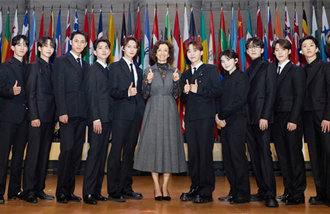Backlash against Reform from Public Servants
Backlash against Reform from Public Servants
Posted May. 23, 2007 03:19,
The government confirmed its plan to advance the press support system, a scheme consolidating all press rooms scattered across the government agencies, at a Cabinet meeting on Tuesday. In response, government officials and politicians alike criticized the plan.
Particularly among public servants, there were concerns that the decision would deepen distrust and conflict between the government and the media, work as an obstacle to carrying out new policies, and cause public confusion.
An economic official working at the Gwacheon Government Complex said, The presidents personal decision and the obedience of some presidents yes-men in charge of national information service have created an impossible plan at the end of the presidential term. Does it make sense that government officials, who have to continue to work after the end of the administration, should be inconvenienced because of a few government officials who dislike the press?
An employee of the Ministry of Planning and Budget in Seocho, Seoul, said, It is inefficient for public servants to go in a group to the Gwacheon Government Complex to give a briefing three or four times a week.
As the public is deeply interested in the education sector, we need to actively inform the press of the policys intention. It will be a major job for us to gather reporters and tell them what we have to inform, said an official of the Ministry of Education and Human Resources Development.
Presidential candidates criticized alike, saying, The plan infringes on the publics right to know and should be thoroughly reviewed.
Former Seoul mayor Lee Myung-bak showed opposition at a press conference, saying, My view does not differ greatly from yours (reporters).
Former leader of the Grand National Party Park Geun-hye said to the reporters, I think this undermines the right of the people to know. Allowing the press to cover and monitor will help maintain transparency in running a government.
Sohn Hak-gyu, former Gyeonggi Province governor, claimed, Prohibiting the access of the press infringes on the publics right to know. The plan to consolidate press rooms and limit the access of reporters should be reconsidered.
Chung Dong-young, former leader of the ruling Uri Party, said, Instead, we should expand press rooms and activate them. The administration should gain public support by offering good policies and hope, not by criticizing or gagging the media.
Meanwhile, at a Cabinet meeting presided by President Roh, the government confirmed the reform plan that consolidates 37 press rooms and reporters rooms of government agencies into three the Seoul Central Government Complex, the Gwacheon Government Complex, and the Daejeon Government Complex - and bans the entry of reporters with no permission into government offices starting this August.
The Central Government Complex in Seoul and the Gwacheon Government Complex will have four joint press rooms and one article delivery room respectively, and the Government Complex in Daejeon will maintain its one joint press room.
Sixteen government agencies including the Office of Prime Minister, the Ministry of Foreign Affairs and Trade, and the Ministry of Unification must use the press rooms in the Central Government Complex, and 10 agencies must use the complex in Gwacheon.
But Cheong Wa Dae, the Public Prosecutors Office, the National Police Agency, the Ministry of Defense, and the Financial Supervisory Commission will use their current press rooms and article delivery rooms given the uniqueness of their work and the location.
sanjuck@donga.com ysh1005@donga.com







